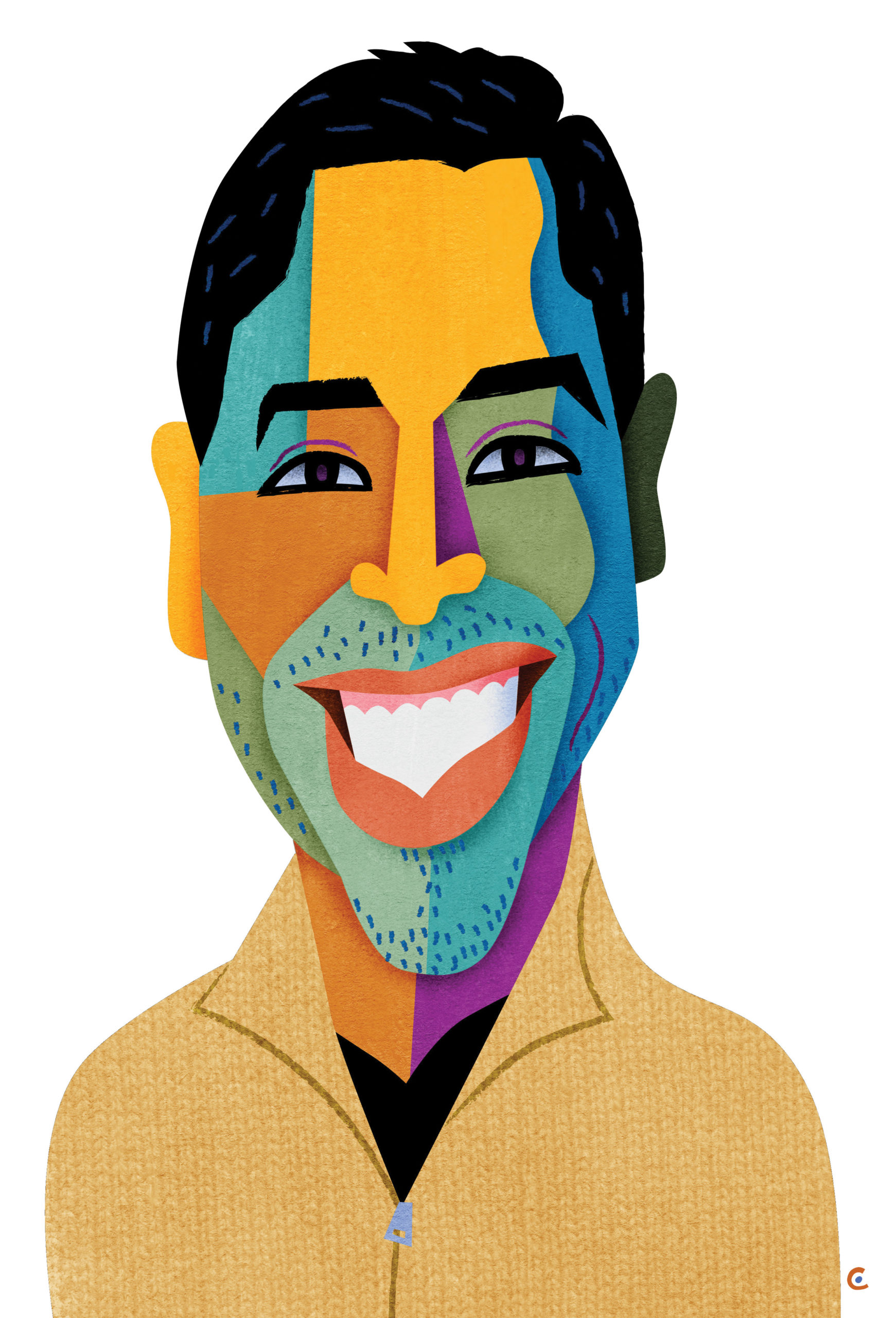Talking to Strangers in Stressful Times
Talking to Strangers in Stressful Times
Miguel Fittoria ’12, ’15W (MS), whose job is to facilitate hard conversations, addresses a burning question: Why are so many of us losing our cool?

(Illustration: David Cowles for Rochester Review)
Editor’s note: The New Horizons program for adult musicians celebrated its 30th birthday in 2021. Founded at the Eastman School of Music, it has grown to nearly 200 chapters around North America and Australia.
I work in the Palo Alto Unified School District as part of a 10-person team of student and family engagement, or “SaFE,” specialists. This year I’m also overseeing our virtual independent program, which is an at-home option created in response to COVID. In both roles, I act as a liaison between families and the school. The SaFE program was set up to offer a guiding hand to parents who are low-income, or don’t have a lot of formal education, or don’t speak English—and who need help navigating the school system. On the other hand, the virtual independent program draws heavily from well-educated and affluent families who make up most of the district.
We’re seeing conversations devolve into arguments much more, and more quickly, than we’ve ever seen. Like many of the examples we hear about in the news, or watch on social media, we’re seeing this happen between people who have a relationship that’s at least in part transactional. Not between close colleagues, or family members, or friends, but between people at the school or school district, and people in the community. Individuals are responding to each other quickly, in a kind of fight-or-flight moment.
There’s a lot of frustration stemming from the novelty of COVID, and all the changes and uncertainty around protocols. It’s caused a lot of things to go wrong, both in our own organizations or ones we interact with. In our case, a lot of families have been confused about COVID protocols. Our district accounts for so many different scenarios. And the first day after winter break, we had a bunch of middle and high schoolers in our new online independent program not able to get into their classes. Their schedules weren’t appearing. It was a mess. We got emails and calls from people saying, “What’s going on?” and “Why is this happening?”
When something goes wrong, it’s stressful on both sides. I’m usually on the “customer”-facing side. People want information and they want it now.
The most detrimental thing you can do is fumble around for an answer that you think is right.
But don’t just say, “I’ll call you or I’ll email you back” either. Or forward the message to someone else, or even worse, say “I’ll transfer you.” We all know those stories! Tell the person who you’re going to talk to; for example, “I am going to go talk to the health coordinator;” and then, “I will get back to you as soon as I have the information.” Now the person is informed, and they have a timeline. And they have someone they know, that they’re now in contact with. When we do things that way, people are usually appreciative.
My team and I are always talking about the idea of spillover. We’re already using so much of our mental and emotional energy to hold the stress back, that any statement or comment can lead us to the worst conclusions, to that fight-or-flight reaction. The spillover can be so hard to contain in that moment. But in all our interactions, it’s important to be aware of the spillover effect on ourselves and to realize the strangers we encounter are probably experiencing it in their own lives, too.
Miguel Fittoria ’12, ’15W (MS)
Home: Palo Alto, California
Coordinator for Student and Family Engagement, Palo Alto Unified School District (pausd.org/student-supports/safe)
Favorite ways to unwind: “My biggest one is spending time in nature. But I’m also a mechanic by hobby. I love it because there’s a solution to every problem. There aren’t always clear solutions in my job. But with a car, if something breaks, you can fix that thing.”
Most Valuable Mentor: “If there’s one person who has influenced my life more than anybody else, it’s Melissa Sturge-Apple [now dean of graduate education and postdoctoral affairs]. I worked in her developmental psychology lab my sophomore year. I was just a little coder. I stuck with it and eventually she had me working on the experiments. My senior year we submitted a paper for publication. And then she offered me a job as research technician at the Mount Hope Family Center. Everything I know about organization and follow through has come from my experience in her labs and the things that she expected of her staff.”
— Interview by Karen McCally ’02 (PhD)
This article originally appeared in the winter 2022 issue of Rochester Review magazine.


